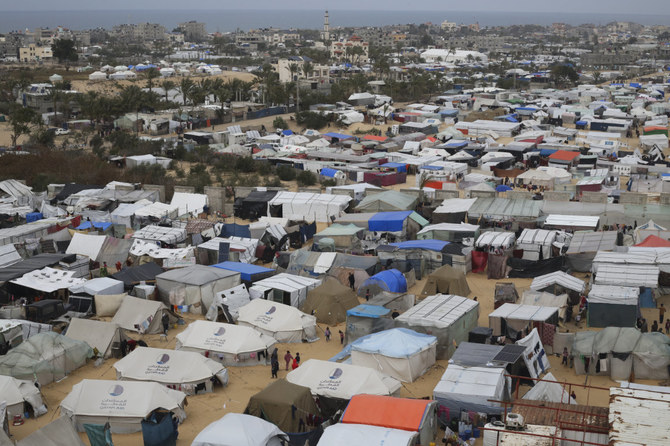
- ARAB NEWS
- 13 Jul 2025

The threat of a possible Israeli military action targeting Rafah, a city adjacent to the Egyptian border, not only puts approximately 1 million displaced Palestinians at risk but also poses a danger to Egypt itself.
Cairo has repeatedly voiced its opposition to this Israeli measure, highlighting its potentially dangerous consequences for the Palestinian issue and the entire region.
Concerns have escalated over the possibility of more displaced people gathering near the Egyptian border, particularly in light of leaked plans from certain Israeli institutions suggesting the evacuation of the entire Gaza Strip as a solution to the crisis. Egypt has vehemently rejected such plans, fearing they would result in permanent displacement and a de facto liquidation of the Palestinian cause. It has stressed the necessity of a two-state solution, establishing an independent Palestinian state along the borders of June 4, 1967, with East Jerusalem as its capital.
Israel’s threat of a ground attack on Rafah followed Prime Minister Benjamin Netanyahu’s announcement of a plan for Israel to regain security control of the area around the Rafah border crossing with Egypt. Cairo denied any discussions with the US and Israel regarding this matter, while expressing grave concerns over any Israeli attempt to advance toward the Salah Al-Din Axis, also known as the Philadelphi Corridor. This would severely strain Egyptian-Israeli relations despite the long-standing peace treaty between the two nations.
Unofficial sources in Egypt have confirmed that an Israeli military invasion of Rafah would violate the terms of the peace agreement and its attached protocol. This agreement stipulates the presence of a limited Israeli military force in the so-called Area D, with observers from the UN. However, any attempt by Israel to move toward the Salah Al-Din Axis would be considered a breach.
While the peace agreement has endured for a considerable period, certain provisions have been modified in response to changing circumstances. For instance, in 2021, Egypt and Israel announced the reinforcement of the Egyptian military presence in Area C to combat terrorist threats in North Sinai.
Any attempt by Israel to equate the invasion of Rafah with counterterrorism efforts in Sinai would be illogical. The attack on Rafah aims to alter its geographical and demographic landscape, unlike Egypt’s military operations against terrorist organizations, which aim to protect its territory without altering it.
Egypt’s rejection of an attack on Rafah aligns with increasing warnings from the international and Arab communities about the potential catastrophic consequences if Israel follows through with its threat to invade the city.
Cairo is unwilling to settle for mere symbolic gestures if its national security and territorial integrity are at risk or if the Palestinian cause is undermined. Militarily, Egypt has significantly fortified its borders with Gaza by creating a 5-km buffer zone and constructing concrete walls both above and below ground. These actions are in accordance with a 2016 agreement with Israel to bolster forces in Area C of the Sinai Peninsula, particularly along the border with Israel, amid ongoing extremist insurgency threats.
Any attempt by Israel to equate the invasion of Rafah with counterterrorism efforts in Sinai would be illogical.
Dr. Abdellatif El-Menawy
Diplomatically, Egypt has presented a united front, employing a comprehensive array of diplomatic maneuvers and measures to safeguard its security interests. It has actively pursued a political course that rejects Israel’s proposal to invade Rafah, garnering support from Arab and Islamic nations, while also rallying international backing to dissuade Tel Aviv from its military plans. Even EU countries have publicly denounced any potential military operations in Rafah.
Egypt has recourse to international law and positions, leveraging entities like the UN and its secretary-general to denounce Israel’s actions and assert the illegitimacy of its control over Rafah. Furthermore, Egypt could opt to suspend certain bilateral agreements with Tel Aviv, including the landmark peace accord, as a response to perceived violations, which would inflict significant losses on Israel and undermine regional peace efforts.
Alternatively, Egypt might withdraw from its mediation role between Israel and Palestine, complicating Israel’s efforts to negotiate the release of captives and jeopardizing trade agreements like the Qualified Industrial Zones pact.
While public criticism between Egypt and Israel is rare, Egyptian officials have rebuked statements made by Israeli figures, such as Finance Minister Bezalel Smotrich, who attempted to blame Cairo for attacks on Israel.
Egypt’s historical significance in the peace process cannot be overstated, as it was the first Arab nation to formally recognize Israel in 1979 and subsequently signed the peace treaty that led to Israel’s return of the Sinai Peninsula.
However, recent tensions, including reports of Egypt threatening to void the peace treaty if Israel were to invade Rafah, underscore the precarious nature of their relationship and the potential for escalation.
Reflecting on past crises, Egypt remains wary of the repercussions of a potential influx of Palestinian refugees reminiscent of the 2008 border crisis, when hundreds breached the Egypt-Gaza border after Israel’s wall was breached. Such a scenario could strain Egypt’s resources and exacerbate regional tensions. Urging restraint and rational dialogue, Egypt hopes to avert a full-blown crisis and mitigate the risks posed by escalating tensions in the region.
• Dr. Abdellatif El-Menawy is a critically acclaimed multimedia journalist, writer and columnist who has covered war zones and conflicts worldwide.
X: @ALMenawy